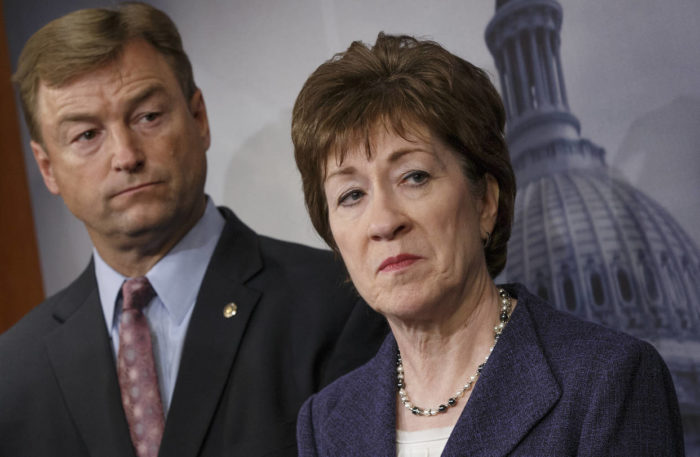GOP Senators who defect from ObamaCare repeal will hurt themselves, their party and the country.
Politics is a team sport, and Republicans are playing it poorly. They have one more chance in the Senate to repeal and replace ObamaCare—possibly their last hope for a victory.
Democrats are performing like a well-coached team. Minority Leader Chuck Schumer has all 48 members of his caucus on board with saving ObamaCare at all cost. It’s been a successful strategy.
It works for one reason: Republicans are divided. Their 52-48 majority in the Senate means they can lose two votes and still prevail, since Vice President Mike Pence is the tiebreaker. After promising to get rid of ObamaCare for the past seven years, it shouldn’t be difficult.
But as many as eight Republican senators opposed the first GOP bill, forcing Majority Leader Mitch McConnell to come up with a revised version. While an improvement, it has encountered opposition too. Mr. McConnell is skillful in bringing senators together. But here his task is more difficult than usual because the dissidents don’t all agree on what’s wrong with the bill. Appeasing one senator may alienate another.
This is an example of why legislative success depends on operating as a team. You don’t abandon your team just because you don’t get everything you want (or want left out). You hold your nose and vote for an imperfect measure, sometimes merely because it’s politically beneficial and better than the alternative.
This is especially true in dumping ObamaCare. The Republican alternative is a more free-market health-care system in which people can buy the insurance they want, not what government requires.
Sticking with the team makes that possible. But too many Republicans aren’t comfortable as team players. To them, it’s shady and unprincipled to vote for something about which you have serious doubts. Democrats are more realistic and less persnickety, so they’re better at uniting.
The political consequences of failing to eliminate ObamaCare would be disastrous for Republicans next year. Midterm elections are always tough for the party that holds the White House. But reneging on the promise to “repeal and replace” would put Republican control of the House and even the Senate at risk.
Worse, ObamaCare would be further entrenched with Republican help. If repeal fails, Mr. McConnell’s Plan B is to compromise with Democrats to stabilize the health insurance marketplace and keep ObamaCare alive and kicking. He would have no other choice.
When the voting begins, Republican senators need to ask themselves three questions: How would the result affect you? How would it affect your party? How would it affect the country?
On the first question, if any Republican senator sees voting to uphold ObamaCare as politically safer, think again. Trying to reach across the aisle to protect Medicaid’s rate of growth won’t win you any new Democratic votes. But if you desert the GOP, the base won’t forget or forgive. Republicans care passionately about ending ObamaCare. If you cross them on this vote, large numbers will cut you loose. There’s private polling on this, by the way.
The House Freedom Caucus learned this the hard way. In May, when its members blocked the first House health-care bill from going forward, they expected to be hailed as heroes. They weren’t. When a second bill was offered, they did nothing to stop it. They got behind the team and it passed.
If the Republican Party fumbles the Senate vote, it will suffer—and will deserve to. Having made the death of ObamaCare its overriding concern, a GOP that fails to deliver would shatter its credibility. An important element of the Republican brand is its identity as the conservative party. Fewer would see it that way if ObamaCare survives. GOP voter turnout would fall, and the party’s candidates would feel the difference.
What about the country? It wouldn’t benefit from making ObamaCare permanent. Health care would cost more and heal less. A political comeback by Democrats could lead to a single-payer system. Anyone who has experienced medical treatment at a Veterans Administration hospital would find the new system quite familiar.
Sen. Rand Paul of Kentucky opposes the Senate bill because it leaves too much of ObamaCare in place. But the alternative is to leave all of it in place.
Sen. Dean Heller of Nevada feels the bill’s Medicaid reforms would hurt thousands of his state’s residents and jeopardize his re-election in 2018. But preserving ObamaCare would hurt millions nationwide and his prospects for winning a second term.
Sen. Susan Collins of Maine says the bill won’t “fix the flaws” in ObamaCare. But the alternative would lock those flaws in place, probably forever.
Messrs. Paul and Heller and Ms. Collins are playing politics as if it’s an individual sport, like golf, boxing or gymnastics. In the Senate, only a team can win.
Source: Fred Barnes, wsj.com
 Listen Online
Listen Online Watch Online
Watch Online Find a Station in Your Area
Find a Station in Your Area









 Listen Now
Listen Now Watch Online
Watch Online
